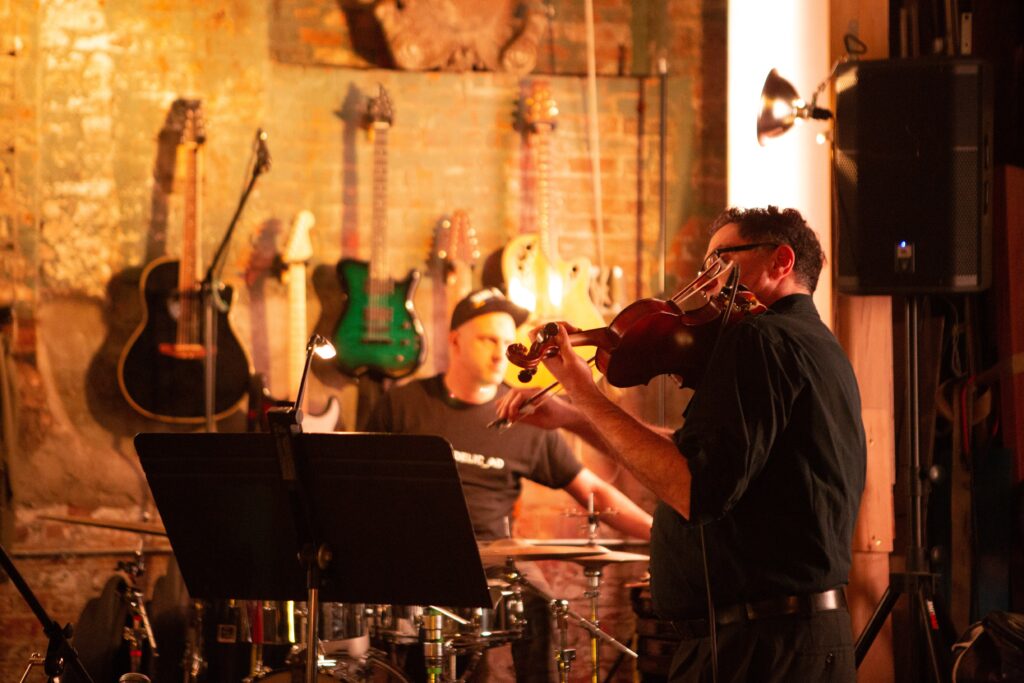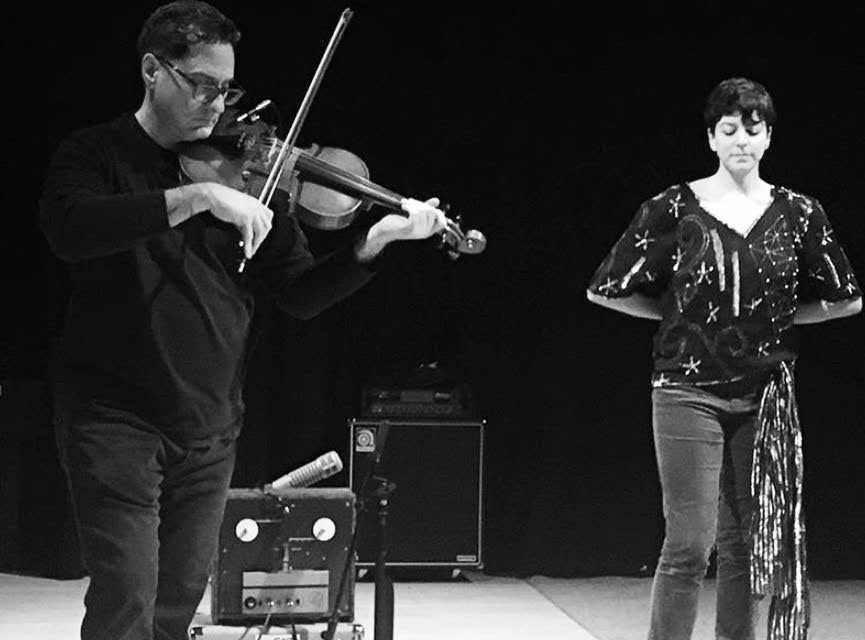“One Foot in Tradition, One in the Future”: 40 Minutes with Mike Khoury

By: Layan Srour / Arab America Contributing Writer
Palestinian American violinist and composer Mike Khoury moves fluidly between rock bands, orchestras, jazz ensembles, and original works—all while staying deeply connected to his heritage. Based in Redford, Michigan, his music reflects a lifelong blend of influences, from traditional Arabic sounds to avant-garde experimentation. For Khoury, music is both personal and political, a way to honor the past while shaping the future.
How has your heritage and culture shaped your identity as a musician?
Being Palestinian is a political statement in and of itself. I believe that Palestinian culture is on the edge of so many things. It has one foot in tradition and one foot in the future. We’re always looking forward, especially in light of recent events, and we’re thinking about what that means to rebuild and what a new light could mean.
When did you first discover a passion for music?
When I was 10, the orchestra program at school came around to visit our classrooms and play instruments. Orchestra was available before band was, so I jumped on that as a chance to get involved with music. It looked cool, it looked exciting.
I really wanted to play the cello, but my parents didn’t want to buy one. They said, “We’re gonna get you a violin. You’re gonna play the violin because it’s easier for us to get that. If you quit, maybe your brothers will play.” They were definitely thinking about the financial implications of purchasing instruments.
I started to take music more seriously when I first moved to the Detroit area. I put myself in positions where I certainly was not the best person in the room, but I wanted to learn from those opportunities. People started to call me to play in live and studio sessions and I then started to pursue my own work and present it. To be quite honest, there’s not a tremendous amount of people working in the space that I’m working in.

What space do you feel most comfortable in?
I definitely feel most comfortable in my own studio, Entropy Stereo, in Redford. I love it because it’s mine. Nobody can take it from me. It has everything that we need to be creative—research materials, books, and music for people coming and playing music. People have made all kinds of pilgrimages to work together with me or other people. I’m always pleased to be able to host people and present music there. It’s an exciting place for creativity for me, and I hope for some other people too.
Who were your biggest musical influences growing up? How has that influenced your style?
My dad was a visual artist and he worked in abstract expressionism. A lot of that translated with music, too. His music went along with the visual artwork that he was doing. When I was a kid, my dad played traditional Arabic music, both classical and folk, Dmitri Shostakovich, John Cage, Indian music, The Beatles, The Rolling Stones, Mozart, and more. There were so many things happening at once and I was just soaking it in. I listened to a lot of heavy metal when I was growing up, too.
I spend a lot of time listening to modern classical music. I’m interested in where people take the next steps in music. That’s what influences me the most. Whether it’s in a folk or tradition, I’m interested in the overlap between those. I’m not talking about fusion, I’m talking about where people can bring their unique experiences and influences to music. That’s what I’m trying to do.
Do you have a project that feels especially meaningful to you?
I would say that “Atlas“ means a lot to me. It was a collaborative piece between myself and Leyya Mona Tawil. The piece is about the interaction with the dance, the music, and the audience. Much of what happened in Gaza over the past 15 months and over the past 15 years has involved sound and movement in not-so-pleasant ways. It’s a very important piece to me. It’s one that’s difficult to perform emotionally for Leyya and me, but physically difficult for her.
What role do you think music plays in preserving or evolving cultural identity?
I think music is really important in terms of both preserving and advancing cultural identity. Some of my research has been on the composer Halim El-Dabh, he’s sort of the grandfather of the Arab avant-garde. I see myself in that path. I think that there’s not as much representation as there could be in the avant-garde, and contributing to that is important. It’s culturally important to who we are, too. It’s great to be able to carry on traditions, whether it’s maqam, something folkloric, or something from the classical music tradition.
Additionally, it’s important to take things a step forward and understand our intellectual heritage and how to bring that along with us as we’re making music. Because we have access to so much more information than we’ve ever had, it’s cool to be able to bring that information together. But, it’s important to me to have a voice that is uniquely Arab, and uniquely Palestinian in terms of the new music that I’m trying to make. It’s important that we have a place in the future of music, not just in the past.
I think that cultural attributes are absorbed; you can feel it in your blood when something is natural. My dad was a ’48 refugee. My grandparents on both sides lived in Palestine, so I was the first generation in the diaspora. Musically speaking, my reference points were Iron Maiden, for example. While that was happening, I also had Umm Kulthum.
You can feel Umm Kulthum awaken within you because you hear it, you identify with it, and you know it’s something great the first time you hear it. The way she’s singing is so special and so connected to who I am as a person and who I am going to be next. I think that’s special, precious, and important. It’s something that we should all nurture. Does that mean that we should play Umm Kulthum for our kids? Yes, yes, we do.
What messages do you strive to convey through your music?
I’m trying to convey my personal experiences in the diaspora throughout my work. I hope my work can be a voice or beacon for people to understand and identify with.

Have you found any challenges as a Palestinian musician in different spaces?
If people don’t value Palestinian rights, then I don’t want to interact with those people. Over the years, I have parted ways with many people I’ve worked with because they’ve played in Israel. I’ve lost friends, or people that I thought were friends, but I certainly have no time or tolerance for those who have silent voices or who think that occupation or genocide is okay.
There’s no place for people who can be supportive or quiet about genocide. That’s not what I’m here to do and that’s not what all my efforts are about. If that’s your orientation, you need to find another place to go. I have no space for people like that. I’ve had people who knew about my orientation and have made sure that I didn’t play in places.
What advice would you give to Arab Americans aspiring to enter the music world?
Do it. Don’t let people tell you not to do it. Don’t be afraid of doing it. Join a group or start a band. If you’re interested in it, there’s always a way. If I can get into these spaces, everybody can, and I hope everybody finds a way. Don’t let anybody tell you that you can’t do it.
About the Article and Author: Layan Srour, a Lebanese musician based in Detroit, Michigan, is passionate about blending her culture through music, research, and education in the United States. 40 Minutes With is a weekly feature where Layan interviews an Arab American musician, exploring their journey through music and culture in America. Connect with Layan on Instagram, Facebook, LinkedIn, or via email.
Want more articles like this? Sign up for our e-newsletter! Check out our blog here!








